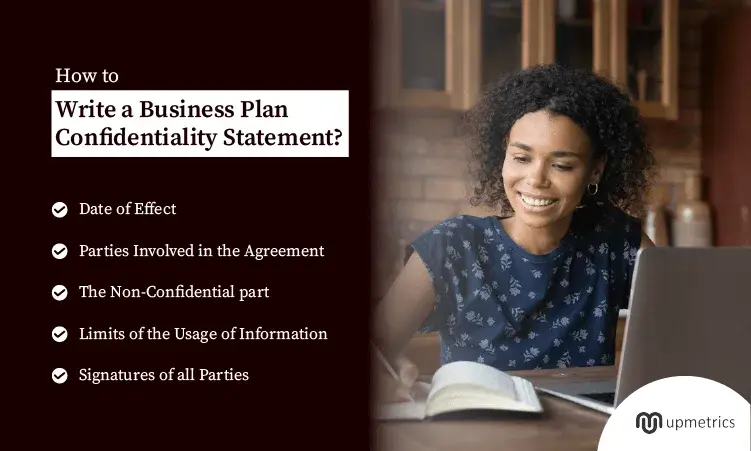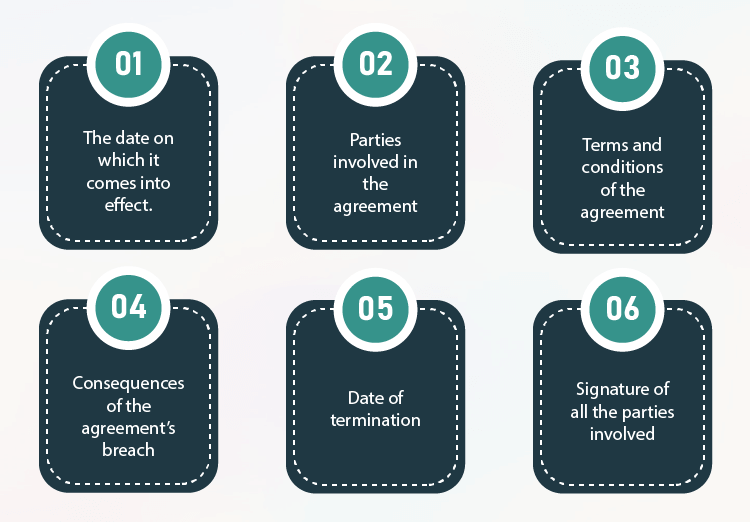

Ev ery company has a unique identity that sets it apart from its rival companies in the industry. It’s a combination of various aspects: The way you set your goals, marketing strategy, manufacturing process, or entire business plan.
As crucial as it is to create a business plan that helps you stand out, it’s perhaps just as crucial to protect your plan from any potential intellectual property theft. This is where a confidentiality statement for your business plan helps you safeguard your valuable assets.
A business plan confidentiality statement is a document that states that the information disclosed to the recipient can’t be disclosed to anyone outside the agreement. It’s an agreement made between two parties before they enter a deal or exchange any sensitive and confidential information.
Even though trust is essential between partners or investors, there’s always a need to stay cautious while handing over your business plans. Even though the organization you plan to work with values confidentiality, everyone involved in it may not.
Your business plan is one of the most elaborate and classified documents. Before disclosing any information, the first and foremost thing is to sign a confidentiality statement. This will avoid the misuse of any information disclosed between the two parties.
When a confidentiality statement is signed, it’s agreed upon by both parties that they won’t expose any of the information that’s discussed or presented in the business plans. Additionally, the document should also mention the penalties in case of a violation of the agreement.
If the other party violates the statement of confidentiality, you can take legal action and receive compensation for the damages you had to bear because of the violation. As per the contract, the compensation is paid.
The absence of a confidentiality statement is an invitation for others to use parts of your business plan. Although copyright laws can help you claim most of your information, some, still, stay unprotected.
Without an agreement, the legal system may not recognize it as a violation.
Most companies include a brief confidential statement on their business plan cover page. Although it’s not a requirement, it delivers a quick message that the document is highly classified. Furthermore, it’s essential to create an exclusive document.
Before creating an agreement, always check with your attorney to be sure of what’s valid according to your state laws.
After you write your business plan, create a stringent confidentiality statement and ensure that it includes the following key elements.
The date of effect is the date from which the confidentiality statement becomes active. An agreement isn’t valid until all the parties sign it; the date of effect follows this.
It’s crucial to specify the parties that will sign the agreement. If someone, you want as a part of the confidentiality statement, hasn’t signed it, they’re not bound by the clauses mentioned in the document.
For instance, two companies are getting into a contract, and the CEOs, representing the entire company, are signing the document. Here it’s essential to mention that all employees are also bound by the agreement even when they haven’t signed it.
Describe and mention all the terms that both parties are agreeing to. This is crucial to the agreement and requires confidentiality. Anything that isn’t included isn’t protected.
Clarify that a recipient would require prior written consent before disclosing any confidential information to a third party.
Along with mentioning the confidential part of your business plan, you should also include the non-confidential part of the agreement. In most cases, there’s a lot of information that’s acquired from other sources. This information won’t show under confidential.
Information relevant to the receiving party won’t be listed under confidential, some of these are:
Here, you mention all the legal consequences that will follow if the receiving party violates the agreement. This can include the procedure and the monetary penalties. According to the uniqueness of the information exposed, the compensation can vary.
Mention the state or country laws that will govern the agreement.The objective of a statement of confidentiality is to restrict the usage of the information that is disclosed to the recipient. Here, you mention the extent to which the data can be used. Also, specify the standard of security that needs to be followed while handling confidential information.
Every agreement has an expiry date, after which both parties are free of the binding clauses. This termination date is set based on various factors like the end of the partnership, the end of a project or an event, or simply the end of the period mentioned in the agreement.
This part of the agreement is usually at the end of the document, which includes any other clauses that don’t necessarily fit into the above categories, but the owner of the information wants to include.
Clearly, this is the most important part of an agreement. Without the signatures of all the parties, the document is pointless and of no value. The agreement, as mentioned previously, can’t go into effect unless everyone involved signs it.
We have written a confidentiality statement example for you, including the above-mentioned elements. This will help you get a better understanding of how to write a confidentiality statement for your business plan.
This BUSINESS PLAN NON-DISCLOSURE AGREEMENT (hereinafter known as the “Agreement”) between ______ (hereinafter known as the “Company”) and ________ (hereinafter known as the “Recipient”) becomes effective as of this ____ day of ____, 20___ (hereinafter known as the “Effective Date”).
– The Recipient’s obligations of non-use and non-disclosure concerning Confidential Information will remain in effect in perpetuity.
– The Recipient’s obligations of non-use and non-disclosure concerning Confidential Information will remain in effect for ____ years from the Effective Date.
This Agreement shall be governed by the laws of the State of ____________, without regard to conflict of law principles.
Company’s Address
______________________________
Recipient’s Address
______________________________
Representative Signature:
Date:
Representative Printed Name:
Representative Title:
Recipient Signature:
Date:
Recipient Printed Name:
As a business owner, it’s extremely important to protect your business ideas, trade secrets, and high-value information from the competitive world. Creating a confidentiality statement ensures that your data doesn’t get shared without your permission.
Now quickly draft your confidentiality statement following the example above and add it to your business plan.
However, if your business plan isn’t ready yet, quickly whip up a fresh plan using Upmetrics’s AI business plan generator. Simply enter your business details, answer a few strategic questions, and see your plan coming together in a few minutes.
Build your Business Plan Faster
with step-by-step Guidance & AI Assistance.